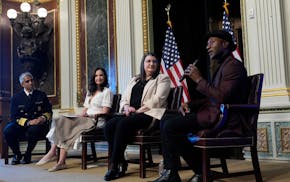It's called the Big Book -- and they don't come much bigger.
Translated into 50 languages, "Alcoholics Anonymous" has sold more than 27 million copies in North America alone. The sale of Bill Wilson's original working manuscript secured $1.56 million at its 2004 auction at Sotheby's, ranking it among the top 10 sales that year, along with the auction of the Magna Carta.
"For those whose lives have been affected by addiction, this is Holy Grail kind of ephemera," Hazelden historian and program director Fred Holmquist said of that 1939 manuscript. "For anyone who wants to understand the foundation of their own sobriety or that of their family, friends, co-workers or loved ones, this book will be a revelation.
"It's a book about miracles."
And now this 161-page manuscript, considered the Bible for recovering alcoholics and addicts, could be coming to an AA meeting near you.
On Oct. 1, Bill W.'s manuscript -- with its every scribble, aside and second thought in the margins -- will be made available to the public for the first time. Hazelden, the internationally known treatment center based in Center City, Minn., is publishing a four-color edition titled "The Book That Started It All."
The book is certain to start some serious debates here in the Land of 10,000 Treatment Centers and at AA meetings worldwide.
"This is like buffs of U.S. history getting the Declaration of Independence with comments in the margins," said Hazelden publisher and senior vice president Nick Motu.
The book, which comes in cloth ($65) as well as leather-bound editions ($125), tells the stories of Bill W. and the others, but it's more than a historical document: It offers a fascinating look into the tensions that created AA's philosophy.
Bill W. was convinced that to forever change the way society treats alcoholics and drug addiction, a strong written document was necessary.
"How could we unify this thing?" he said in 1954 of AA. "If this movement was to propagate, it had to have a literature so its methods could not be garbled either by the drunks or by the general public."
Few works of writing have been more closely scrutinized than the story that begins with Bill W.'s freefall due to alcohol, around the time the stock market crashed in 1929. At a recent Big Book meeting at the Depot Coffee House in Hopkins, where AA meetings are held daily, everyone had a theory about Bill W.'s life and writing -- from the guy who said he'd been in the program for 36 years to the newcomer who admitted she'd been sober all of 18 hours.
Now, with this manuscript and accompanying essays that follow, readers learn how Bill and the original 100 members of AA took nothing for granted. There was even debate over the title of the book: "The Empty Glass"? "The Dry Life"? "The Way Out"? "One Hundred Men"? (Yes, the writing is sexist at times.)
The great debate
Nearly every page offers reminders that before there were 12 steps, there was a first, second and countless other drafts written and spirited debates argued in creating the original manuscript. Some of those debates over the role of religion and spirituality in AA leap off the page. In this book, reading between the lines includes Bill's handwritten inserts above the many cross-outs.
"They really wanted the newcomer to have their miracles ... and grow their fellowship," Holmquist said. "Without fellowship, their own recoveries were at risk. Bill W. was saying that there's an alternative to all these tragedies."
That copies of this manuscript are being reproduced at all is something of a miracle in itself.
About 400 copies were distributed by Wilson in 1939, but the original AA manuscript was stored for 40 years within Bill and Lois Wilson's home in Bedford Hills, N.Y. Bill Wilson died in 1971. Seven years later, Lois gave the manuscript to a friend in Montreal, and the manuscript was all but forgotten for 30 years.
Its current owner made high-resolution copies of the manuscript pages available to Hazelden to publish. And even though the treatment center expects the book to be popular, it's not likely to turn a profit.
"It's not commercially viable to do this," Motu said. "This is more a work of love."
Paul Levy • 612-673-4419

